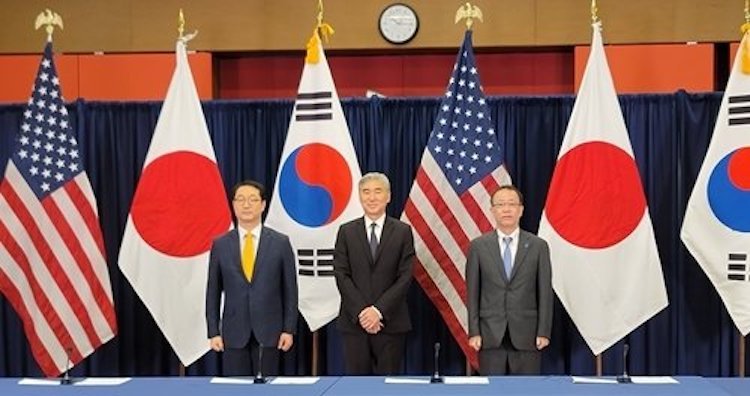By Thalif Deen
UNITED NATIONS, 10 April 2023 (IDN) — The United States and its two closest Asian allies—Japan and South Korea—have accused the North Koreans of illegally financing its ballistic missile programmes.
In a hard-hitting statement released on April 7, the three countries reiterate with concern that overseas IT workers of the Democratic People’s Republic of Korea (DPRK) “continue using forged identities and nationalities to evade UN Security Council (UNSC) sanctions and earn income abroad that funds the DPRK’s unlawful WMD and ballistic missile programs”.
“We are also deeply concerned about how the DPRK supports these programs by stealing and laundering funds as well as gathering information through malicious cyber activities,” said the statement
According to the UN Panel of Experts, the DPRK attempted to steal as much as $2 billion between 2015 and 2019 through cyber means. And according to private industry estimates, the DPRK stole up to $1.7 billion in cryptocurrency in 2022 alone.
“We highlight the importance of our joint efforts to block such illicit revenue streams”, the three countries warned.
Joseph Gerson, President of the Campaign for Peace, Disarmament and Common Security and Convener of the Peace & Planet International Network, told IDN this report is probably true.
North Korea, he pointed out, has been known in the past for its nasty hacking and printing counterfeit hundred-dollar bills.
“These, however, are symptoms of much deeper problems: on the one side, North Korea’s military-first dictatorship, and on the other, the history of U.S. nuclear threats against the DPRK and massive U.S., South Korean military exercises—sometime joined by other nations—that include preparations to decapitate and overthrown the North Korean regime”.
To address the root of these problems, he argued, the U.S. and South Korea should significantly reduce the scale of their military exercises and signal their willingness to engage in peace negotiations to finally and formally end the Korean War, with a peace agreement replacing the 70-year-old armistice.
“These actions, in turn, could provide the foundation for de-militarizing the ongoing Korean crisis”, declared Gerson.
The joint statement was released under the names of the U.S. Special Representative for the DPRK Sung Kim; the Republic of Korea’s Special Representative for Korean Peninsula Peace and Security Affairs Kim Gunn; and Japanese Director-General of the Asian and Oceanian Affairs Bureau Funakoshi Takehiro.
Focusing on the illegal funding, the statement also said: “We strongly condemn the DPRK’s repeated ballistic missile launches as well as its escalatory and destabilizing rhetoric related to the use of nuclear weapons.”
“We express deep regret that the DPRK continues to ignore the hardship of its people, choosing instead to pour its scarce resources into its WMD and ballistic missile programs in clear violation of multiple United Nations Security Council (UNSC) resolutions. We commit ourselves to further strengthening and diversifying security cooperation to counter the threat the DPRK poses to regional and global security”.
“The U.S. Special Representative reiterates that the U.S. commitments to defend the ROK and Japan are ironclad,” it added.
The three countries also urged the DPRK to abide by its obligations under all relevant UNSC resolutions and call on all UN Member States to fully implement the UNSC resolutions.
In particular, they underscored that in accordance with UNSC resolution 2397 (2017), UN Member States are required to repatriate all DPRK laborers earning income in their jurisdictions, unless repatriation is prohibited by applicable national or international law. UN Member States should be vigilant and ensure that no work authorizations are renewed or granted to overseas DPRK laborers consistent with UNSC resolution 2375 (2017) and address the DPRK’s attempts to evade sanctions.
In a statement released March 17, Secretary-General António Guterres “strongly condemned the launch of yet another ballistic missile of intercontinental range by the Democratic People’s Republic of Korea.”
Guterres reiterated his calls on the DPRK “to immediately desist from taking any further destabilizing actions, to fully comply with its international obligations under all relevant Security Council resolutions, and to resume dialogue leading to sustainable peace and the complete and verifiable denuclearization of the Korean Peninsula.”
Briefing the UN Security Council (UNSC) on March 20, Miroslav Jenča, Assistant Secretary-General for Europe, Central Asia and the Americas, Departments for Political and Peacebuilding Affairs and Peace Operations, emphasized that “the situation on the Korean Peninsula continues to head in the wrong direction.”
He singled out the most recent launches and informed delegates that Pyongyang has carried out 14 launches of ballistic missiles in 2023 after sending out 70 launches that used ballistic-missile technology in 2022.
Citing the Secretary-General’s strong condemnation of the release of another ballistic missile with intercontinental range, he also underscored that tensions are continuing to increase “with no off-ramps in sight”.
He urged the DPRK to refrain from additional launches and restart dialogue that will lead to a sustainable peace and the complete and verifiable denuclearization of the Korean Peninsula.
He also urged that communication channels be enhanced, particularly military to military. “Reducing confrontational rhetoric will help to lower political tensions and create space to explore diplomatic avenues,” he said.
Meanwhile, the UN said in a press release March 20, that Security Council members “chided each other for their prolonged inaction which has led to monthly meetings and has eroded the Council’s credibility as a guarantor of international peace and security.”
Jenca also emphasized that ”it is time for a comprehensive resolution that addresses international security concerns with new targeted measures, sets the conditions for renewed dialogue and facilitates humanitarian aid.” [IDN-InDepthNews]
Photo credit: YonhapImage | Kim Gunn (L), South Korea’s special representative for Korean Peninsula peace and security affairs, poses for a photo with Sung Kim (C), U.S. special envoy for North Korea, and Takehiro Funakoshi, head of the Japanese foreign ministry’s Asian and Oceanian Affairs Bureau, during their talks on North Korea at the U.S. Embassy in Jakarta, Indonesia, on 13 Dec. 2022.


